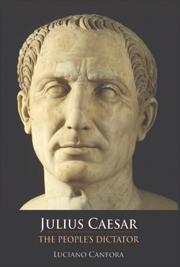Book contents
- Frontmatter
- Contents
- Translators' Note
- Acknowledgements
- Foreword
- PART I FROM SULLA TO CATILINE
- 1 In Flight from Sulla: First Experiences of an Aristocratic Youth
- 2 Prisoner of the Pirates (75–74 BC)
- 3 The Rise of a Party Leader
- 4 Pontifex Maximus
- 5 The ‘Affairs’ of Mr Julius Caesar and Others
- 6 The Political Market
- 7 Inside and Outside the Conspiracy
- 8 Caesar's Senate Speech Rewritten by Sallust
- PART II FROM THE TRIUMVIRATE TO THE CONQUEST OF GAUL
- PART III THE LONG CIVIL WAR
- PART IV FROM THE CONSPIRACY TO THE TRIUMPH OF CAESARISM
- Chronology
- Bibliography
- Index
4 - Pontifex Maximus
from PART I - FROM SULLA TO CATILINE
Published online by Cambridge University Press: 05 August 2013
- Frontmatter
- Contents
- Translators' Note
- Acknowledgements
- Foreword
- PART I FROM SULLA TO CATILINE
- 1 In Flight from Sulla: First Experiences of an Aristocratic Youth
- 2 Prisoner of the Pirates (75–74 BC)
- 3 The Rise of a Party Leader
- 4 Pontifex Maximus
- 5 The ‘Affairs’ of Mr Julius Caesar and Others
- 6 The Political Market
- 7 Inside and Outside the Conspiracy
- 8 Caesar's Senate Speech Rewritten by Sallust
- PART II FROM THE TRIUMVIRATE TO THE CONQUEST OF GAUL
- PART III THE LONG CIVIL WAR
- PART IV FROM THE CONSPIRACY TO THE TRIUMPH OF CAESARISM
- Chronology
- Bibliography
- Index
Summary
sed pietate ac religione […] omnes gentes nationesque superavimus.
CiceroThe démarche which led to the surprise capture of the office of pontifex maximus (high priest) in 63 bc was one of Caesar's most successful. Thanks to his efforts, the pontificate had again become an elected office – another blow against Sulla's constitutional reforms. This sacred office carried with it immense importance in Roman politics. Caesar, a sceptic ever close to the Epicureans in his beliefs, clearly did not hesitate for an instant to compete for the role of supreme guardian of the religion of the state, a post which by its nature stood above everyday political squabbles. Being an Epicurean in his intellectual sympathies, Caesar understood the power of this instrumentum regni. He realised full well that false notions concerning the gods had generated fear, and that this fear had produced a false religion, a cult which rested on an almost commercial relationship with the gods. Caesar had much respect for the Epicureans – both militant and moderate – who propagated the ‘dangerous’ doctrine, as Benjamin Farrington aptly put it, ‘that God does not dwell in a temple made with hands – even if the authority responsible for its erection be the State’. He also knew that Greek political writers were deeply involved in Roman reality, to the point of being champions of ‘realpolitik’.
- Type
- Chapter
- Information
- Julius CaesarThe People's Dictator, pp. 23 - 25Publisher: Edinburgh University PressPrint publication year: 2007



